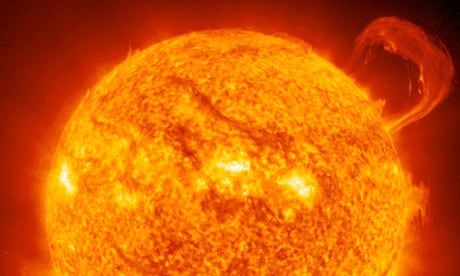Britain is vulnerable to attack from space-fired nuclear weapons and "space weather" – the result of changes in solar activity – and the government is not doing enough to combat its potentially devastating impact, a cross-party group of MPs has warned.
The likelihood of a severe space weather event has "the potential to cause damage to electrically conducting systems such as power grids, pipelines and signalling circuits", says a report by the Commons defence committee, which also claims Britain would be vulnerable to attack from space-fired weapons.
It describes space weather as a "naturally occurring phenomenon that can impact upon the Earth's environment in ways that are detrimental to key technologies in operation in space, the atmosphere and the surface of the Earth".
"The term, space weather, generally refers to changes in the space environment near Earth, caused by varying conditions in the sun's atmosphere. Solar activity adheres roughly to an 11-year cycle, with solar activity increasing during a 'solar maximum', making space weather events more likely." The next solar maximum is predicted to occur in 2013, the committee notes.
It says the government assesses the likelihood of an attack from either conventional or high-altitude nuclear electro-magnetic pulse (EMP) weapons to be low. However, certain states such as Iran could pose a realistic threat in future if nuclear non-proliferation efforts fail.
"The potential impact of such a weapon could be devastating and long-lasting for UK infrastructure," the committee warns. "It is therefore vitally important that the work of hardening UK infrastructure is begun now and carried out as a matter of urgency."
The Ministry of Defence told the MPs that Britain's Trident nuclear missile "firing chain" was designed and maintained to ensure it could be used to retaliate in the event of a nuclear attack.
EMP disturbances, the report emphasises, pose a serious risk, not only to civil infrastructure, but to military systems and "ultimately national security". The lack of any clear line of responsibility within the MoD suggests it is unwilling to take the threat seriously, the report adds.
It says the MoD must share information with those responsible for civilian infrastructure. The ministry did not provide the MPs with some information it holds about the likelihood of EMP weapons being used, contingency plans in response to the loss of the UK's electronic infrastructure, the role of the military in such an event, and the risk to satellites posed by space debris.
"The reactive posture described by the MoD appears somewhat complacent," says the report. "Prior war-gaming and planning is required to assess the likely involvement of MoD resources in dealing with the consequences of EMP events."
It describes the security of satellites as a matter of increasing concern because of growing reliance on them and the sheer number of satellites in orbit.
"The government must consider the long-term security of satellite technology and ensure that national interests are protected where we rely on other nations for data, such as GPS."
There appeared to be no single government department responsible for taking immediate responsibility in the event of a severe space weather event. "It is not good enough to say that that will depend on where the greatest impact fell," the report says.
James Arbuthnot, the Conservative chairman of the defence committee, said: "Space weather is a global threat and may affect many regions and countries simultaneously. It is time that the government began to approach this matter with the seriousness it deserves.
"We are concerned that the government does not regard EMP from a nuclear blast as currently being a high risk and so we urge that more vigorous action should be taken to prepare for such an attack."

Comments (…)
Sign in or create your Guardian account to join the discussion